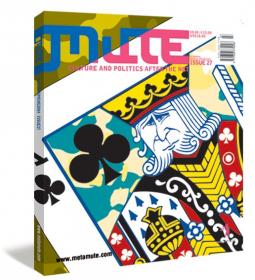George Orwell's novel 1984 has had a good innings over the last few years: in addition to the runaway success of Endemol's Big Brother format and Reality TV in general, our current affairs are now dominated by a vocabulary that appears to come straight out of the more sinister pages of the book. As if in readiness for last year's centenary of the author's birth, evocatively named governmental agencies, catchy think tank and policy memes and global military campaigns have ensured that the fictional Ministry of Truth has been granted yet another lease of life in fact. The strategic mission of Orwell's Newspeak was the total colonisation of language and the imagination. But beyond the grandstanding of self-consciously political forms of language, unknown power lies in the cracks, whose furtive path betroths us to the dull yet brilliant magic of the everyday.
2003-11, ISSN 1356-7748-27
FURTHER DESCRIPTION
Includes:
Luciana Parisi on Abstract Sex
Simon Ford on the advent of computer art archiving projects
The University of Openness' Faculty of Cartography unravel the potentials of the Semantic Web
Hari Kunzru on Amy Balkin's guerilla conceptual art work
JJ King on Openness
Peter Drahos & John Braithwaite on America's strategic use of bilateralism
Harry Potter on the Wikipedia
Sebastian Olma on Peter Lynds' theory of time
Peter Suchin on Mark Aerial Waller
Goldie on Whitehouse
Ruth Maclennan on television and science
Betti Marenko & Miriam Swain on sci-art
Artists' projects by Eyal Weizman, Dani Bauer, Anselm Franke and Rafi Segal, Emma Hedditch, and L=A=N=G=U=A=G=E poet Ron Silliman
Lavish Full Colour Illustrated
Dimensions: 27.5 x 24 x 1 cm
144 pages
ISSN 1356-7748









